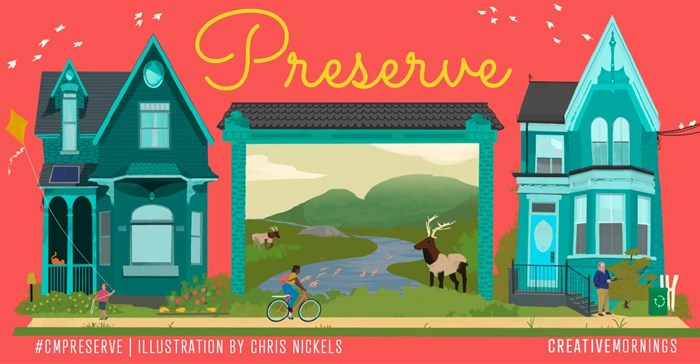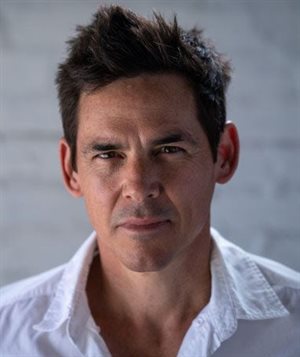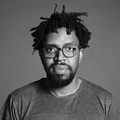Listening to Ashley Dowds is a treat for the ears, as the dips and excited peaks of his voice serve as evidence of the "goosies" he gets from the stories he tells, which transport you to another place, where both memory and imagination run wild.

#CMpreserve image by Chris Nickels.
Dowds was a speaker at the May edition of Creative Mornings Cape Town, on the month’s theme of ‘Preserve’.
Creative Mornings introduced the theme as follows:
The beauty in our world deserves to be cherished, sustained, and rediscovered. We share this life, and every day we have the opportunity to act as thoughtful participants in it. What do we care about? What do we take for granted? Would we miss it if it disappeared? Preservation begins with asking deep questions and turning our attention to the environment around us.
Our daily habits are a mirror reflecting back what we truly care about. Our actions are key to protecting the wellbeing of our communities, cities, and planet. Together, we can chart a brighter path into the future.
Memory, imagination and back again

Ashley Dowds.
Dowds was a worthy speaker on this topic as he began teaching English and Drama, in the early-1990s, after which his acting career began on stage at The Natal Playhouse by the end of the 1990s.
He then moved to Johannesburg to pursue a career in television, mainly as an anchor for SABC3 and the Home Channel, and regular presenter on Lifestyle Matters and travel show, Going Nowhere Slowly, which provided material for his book, Red Car Diaries and led to his stint as columnist for Country Life.
He has since presented the Another Side of Africa series on Amazon Prime and his move to Cape Town and fascination with podcasts has led to another platform for Dowds – radio and voice artistry. An intriguing introduction, the audience had their phones out, taking notes and looking up the numerous podcasts Dowds recommended throughout the morning.
But first, he set the scene for the morning’s talk, on the specific topic of imagination, memory and audience.
Memory and imagination are part of the same biochemical processes. You can’t remember if you’re not able to imagine, you can’t imagine if you’re not able to remember.
Ultimately, as humans we are wired for story.
The Audi-ence
From his interviews over the years, Dowds has learned to use a lapel mic as people often bang the table with emotion when speaking, which distorts the sound if you’ve placed a recorder on the table.
Dowds spoke of listening to the likes of Squad Cars on the radio as a young boy and how the very essence of storytelling is the listening experience.
Even the word ‘audience’ comes from ‘audio’, showing the importance of sound. As you listen to a play or TV show, you use language to unlock the meaning.
Dowds spoke of Shakespeare’s golden age of theatre, which all hinged on the way the actors expressed themselves to engage the audience’s imagination.The human voice is nuanced enough to convey so much in one syllable that the ear picks up a universe of meaning.
To illustrate this, Dowds said the artist Janet Cardiff sculpts and conjures in sound, creating ‘audio walks’ for her audience. She came across an a cappella human voice chorus, which speaks for itself and her fascination with creating this type of experience for audiences…
Dowds explained that it’s moving to hear the human voice, as it unlocks both memory and imagination.
Memory and re-membering
A memory is often triggered by our thoughts and associations, and there’s an oral tradition in family genealogy that defines us as individuals.
Dowds said to think of your own family – close your eyes and visualise your parents holding hands with their parents, and behind them, your great-grandparents – going as far back as you can.
Dowds added that throughout history, the grandmother was traditionally the storyteller, with the rest of the family listening. He says with the rise of technology, this is, unfortunately, becoming a lost art as we no longer gather around the dinner table and talk to each other.
But family stories can turn into a game of broken telephone as the memory reinvents itself.
Walking further down memory’s lane, Dowds said that Herodotus, the first true historian, went out and collected stories of the Persian War, which became known as the first-known systematic investigation of the past and the founding work of history in Western literature. Through his storytelling and listening, Heroditus also found out about the geography of the world.
If you’ve watched Peter Jackson’s reconstruction of the First World War, Dowds says you’ll note much of the story lies in the from the voices of the speakers. As an actor, he notes how you can step back in history just by changing your voice.
So storytelling is ultimately about painting a picture for the audience with your voice – and in doing so, you activate both their memory and imagination, which in turn is how stories are preserved in time.
The universal conscience and preservation of shared stories
Speaking then of the concept of the physiology of memory, and a universal consciousness that connects to the individual, Dowds spoke of Steve Ramirez’s work in the field at Boston University’s department of psychological and brain sciences, in finding that every experience leaves physical traces in the brain.
Dowds shared that he personally became obsessed with the concepts of the persistence of consciousness after death and the idea of a single consciousness after interviewing a neurosurgeon working closely with his mother before her passing.
Discovering podcasts opened up new storytelling vistas for Dowds, unlocking some of his experience.
He spoke of a series on Oliver Sacks’ stories in particular – the author of The Man Who Mistook his Wife for a Hat and Other Clinical Tales. In the story of 88-year-old Mrs O’C, who worried she was going crazy when she woke to the sound of loud music one day and started regularly hearing snippets of a song no-one else was aware of.
Eventually, it was found that she had suffered a slight stroke believed to have triggered musical epilepsy. We don’t remember much from before the age of three – the theory is that memories from before that age are locked away in a chamber of the brain.
Emotion and memory in the inner ear
So perhaps, the song Mrs O’C kept hearing was a memory of her mother singing to her. Once Mrs O’C was presented with this idea, the instances of the song slowly started to fade.
Dowds’ fascination with storytelling’s place both in the brain and the collective consciousness grew through a short interview with someone with Guillain-Barre syndrome, as described in the memoir The Diving Bell and the Butterfly, which was written through the blinking of the author’s eye in Morse code after suffering a massive stroke that left him ‘locked in’ his body.
Dowds has only lived in Cape Town for two years but is intrigued by the stories he’s discovering here.
He filled in for a show on Radio Today and discovered a fresh passion for telling the stories others may have missed, like the man who lives around the corner and has won the toughest, longest horse race in the world in Mongolia, or in getting to know the fourth-generation owner of Yogi’s Barbershop on Buitengracht Street.
Retelling stories as re-affirming and preserving memory
In retelling their stories, we are re-affirming and preserving the memory. In trying to get down to who he is and what Cape Town is, Dowds said you arrive in a new city with fresh eyes and he’s loving telling the story others people have either gotten jaded with or never even noticed.
Dowds said there’s a whole sea of other consciousness out there, so we are storytellers at heart as we navigate our way through life with stories. Without them, we’d be miserable.
Exploring the role of the inner ear, and unlocking the internal landscape of the imagination, Dowds explained how storytelling has evolved to incorporate binaural sounds in connecting to headphones.
Dowds says to close your eyes, plug in your headphones and listen to the below for an idea of how to use just binaural sounds, where sounds are recorded on two microphones, arranged to create a 3-D stereo sound sensation for the listener of actually being in the room with the performers or instruments, as a storytelling device:
This is all proof again that the audience is the artist when it comes to storytelling. And through storytelling, we can preserve memories and trigger the imagination for generations to come.
Based on his fascination with telling and preserving stories, Dowds is now the creator of #JustSaying – radio stories that matter, and Story2Voice. Follow Dowds and Creative Mornings on Twitter.











































